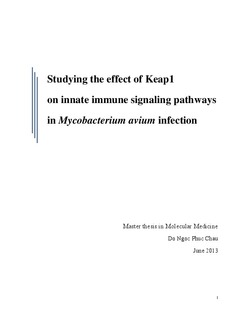| dc.contributor.advisor | Flo, Trude Helen | nb_NO |
| dc.contributor.author | Chau, Do Ngoc Phuc | nb_NO |
| dc.date.accessioned | 2014-12-19T14:18:53Z | |
| dc.date.available | 2014-12-19T14:18:53Z | |
| dc.date.created | 2013-08-26 | nb_NO |
| dc.date.issued | 2013 | nb_NO |
| dc.identifier | 643083 | nb_NO |
| dc.identifier.uri | http://hdl.handle.net/11250/263634 | |
| dc.description.abstract | The Mycobacterium species include pathogens causing serious diseases in mammals. Mycobacterium avium complex (MAC), while it has low virulence to normal people, it is a high potential pathogen causing TB-like disease in AIDS patients. Keap1 have studies by many researchers as a potential treatment in cancers. And its multi-binding property might give it an important role as a link between ROS, inflammation and autophagy. We knocked down the Keap1 in primary human monocyte-derived macrophages and investigated its role in immune response mechanism and killing of M. avium in human primary macrophages. Here, we found that not only IKKβ is under Keap1’s effect, but also all IKK complex molecules and TBK1 are also affected by Keap1. This leads to the higher protein level of NF-κB in Keap1 knockdown compared to control cells. Moreover, in autophagy, Keap1 has negative effect on accumulation of LC3B ii protein-related autophagy. Further investigation, we observed that Keap1 allows the growth of intracellular mycobacteria during 3 days of infection. Our study was done in vitro and limited to the macrophages only, in summary, it does not necessarily mean that the Keap1 gives disadvantage in controlling the M. avium infection. The role of Keap1 in the adaptive immune system should be studied to see clearly the effect of Keap1 in whole system. | nb_NO |
| dc.language | eng | nb_NO |
| dc.publisher | Norges teknisk-naturvitenskapelige universitet, Det medisinske fakultet, Institutt for kreftforskning og molekylær medisin | nb_NO |
| dc.title | Studying the effect of Keap1 on innate immune signaling pathways in Mycobacterium avium infection | nb_NO |
| dc.type | Master thesis | nb_NO |
| dc.contributor.department | Norges teknisk-naturvitenskapelige universitet, Det medisinske fakultet, Institutt for kreftforskning og molekylær medisin | nb_NO |
